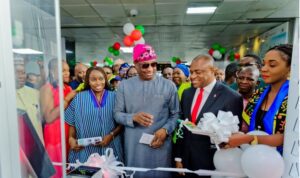Ecobank Nigeria has stable outlook, quality management – Fitch rating
By Kayode Tokede
Fitch Ratings has assigned Ecobank Nigeria Limited (ENG) a Long-Term Issuer Default Rating (IDR) of ‘B-’ with a Stable Outlook, Viability Rating (VR) of ‘b-’ and National Long-Term Rating of ‘BBB (nga)’. The report, released Thursday, noted that Ecobank Nigeria IDRs are driven by its standalone creditworthiness, as expressed by its Viability Rating (VR).
The VR reflects the constraint of Nigeria’s challenging operating environment and modest core capital buffers amongst others. This is balanced by company profile strengths as well as a solid funding profile and good foreign-currency liquidity, which is enhanced by prudent liquidity management by the Ecobank group.
According to Fitch, “the Stable Outlook on ENG’s Long-Term IDR reflects our view that the bank has sufficient headroom at its current rating to absorb moderate shocks from sustained downside risks to the operating environment, the heightened level of risk in doing banking business in Nigeria and the ensuing risks to its financial performance (particularly asset quality) over the next 12-18 months.
The Stable Outlook also reflects our expectations that capitalisation will remain resilient over this period with the bank maintaining adequate buffers over the minimum regulatory requirements.”
Fitch Rating reported that the VR benefits from ENG’s company profile strengths of being part of the leading pan-African Ecobank group. ENG is a 100per cent owned subsidiary of Ecobank Transnational Incorporated (ETI; B-/Stable).
ETI is a regional bank holding company with fully-fledged banking subsidiaries in 33 African countries (collectively the group).
The group also has a banking license in France and representative offices in Addis Ababa, Johannesburg, Beijing, London, and Dubai. The group’s operations are highly integrated, with all entities connected to a common operating platform and risk management framework, and common branding.
ENG is a material subsidiary for ETI, and its largest single entity, contributing to 23per cent of group assets at end-9M20.
ETI continues to implement a turnaround strategy at Ecobank Nigeria, having deleveraged and de-risked the bank in recent years, although it returned to growth in 2020 and plans above-sector-average loan growth in the medium term.
Fitch noted that ENG’s management quality is a relative strength, with ETI appointing experienced bankers to Ecobank Nigeria’s senior team.
“ENG has a solid funding profile, with low-cost current and savings accounts reaching 58per cent of total deposits at end-9M20 helping the bank to reduce its cost of funding. It has achieved good deposit growth through the expansion of digital channels and its financial inclusion initiatives.
Retail and SME deposits to account for 58% of total customer deposits at end-9M20, which results in reasonable deposit concentration, with the top 20 customer deposits representing 29per cent of the total,” the report stated.
Fitch Ratings also views ENG’s liquidity management as prudent with contingency plans in place. Local-currency liquidity is underpinned by a high share of liquid assets (cash, interbank placements and sovereign securities) representing more than 50per cent of total assets at end-9M20. ENG’s foreign-currency funding benefits from sizeable interbank deposits, which represented about 15per cent of total funding at end-9M20.
More than half of these deposits (about $400 million) came from ETI’s affiliates at end-9M20. This reflects the group’s well-established inter-affiliate short-term deposit placement programme (IAP), amounting to $650 million at end-1H20, which provides ENG with a significant competitive advantage compared with most other Nigerian banks, as ENG is able to rely on IAP funding when foreign-currency liquidity conditions temporarily tighten in Nigeria.




